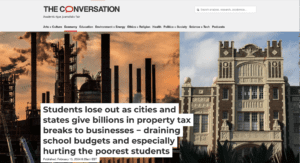If it wasn’t in the budget to fund playground equipment, how can it also be in the budget to give one of the most powerful corporations [Exxon Mobil] in the world a tax break? The math just ain’t mathing.

A powerful analysis by The Conversation, a global NGO, finds that wasteful corporate giveaways harm American school districts — and especially those with mostly Black and Brown students — while also failing to create new jobs.
The harms are especially borne by poor students, it found, and given that U.S. poverty is racialized, that means children of color lose the most.
The Conversation, which publishes articles by academic experts on topics of which they have great expertise, spent months looking at the relationship between subsidies given to companies in the name of economic development and school funding.
They found in some communities, abated money (that is, tax breaks) forces schools to delay maintenance, increase class sizes, and lay off teachers and support staff, among other harms. The supposed benefits communities are rarely, if ever, realized.
Consider Atlanta, where public schools are seeing high rates of absenteeism among Black students, homelessness is on the rise, and the district is having difficulty attracting teachers due to low pay. It’s also where the Fulton County development authority gave a developer $16 million to build a mixed-use development in a vibrant part of Atlanta; its tenants include Google and Invesco.
In Philadelphia, seven schools closed temporarily because of possible and actual asbestos contamination. Cleaning up those and other harmful toxins would cost $430 million, money the school district doesn’t have – because it loses more than $100 million each year to corporate tax abatements.
In East Baton Rouge, Louisiana the district is not able to hire bus drivers and teachers because it pays so little. A student said the money should be used to improve internet access or to hire someone to pick up trash and debris from their playground.
The student asked: “If it wasn’t in the budget to fund playground equipment, how can it also be in the budget to give one of the most powerful corporations [Exxon Mobil] in the world a tax break? The math just ain’t mathing.”
More from the story:
“Tax abatement programs have long been controversial, pitting states and communities against one another in beggar-thy-neighbor contests. Their economic value is also, at best, unclear: Studies show most companies would have made the same location decision without taxpayer subsidies. Meanwhile, schools make up the largest cost item in these communities, meaning they suffer most when companies are granted breaks in property taxes.
A three-month investigation by The Conversation and three scholars with expertise in economic development, tax laws and education policy shows that the cash drain from these programs is not equally shared by schools in the same communities. At the local level, tax abatements and exemptions often come at the cost of critical funding for school districts that disproportionately serve students from low-income households and who are racial minorities…
Lost funding also prevents teachers and staff, who often feed, clothe and otherwise go above and beyond to help students in need, from earning a living wage. All told, tax abatements can end up harming a community’s value, with constant funding shortfalls creating a cycle of decline.”
Read the full story at The Conversation.
For more information on how to find what communities lose to tax abatements, head to our page on Tax Abatement Disclosures (GASB 77) and on Protecting Public Education
Until next time.
P.S. We just released our 2023 Annual Report. Learn about the ways we’re working to build an economy that benefits not shareholders, but students, workers, our neighbors, and our small businesses.